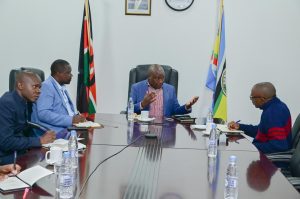NIMCA President calls for a critical review of Africa’s media landscape

The Media Council of Tanzania (MCT) Executive Secretary and President of the Network of Independent Media Councils in Africa (NIMCA), Ernest Sungura (right), listens to Media Council of Kenya (MCK) Chief Executive Officer David Omwoyo (center) during a planning meeting in Nairobi. Also in the photo are NIMCA Technical Team member and MCK Director Victor Bwire (in a blue coat) and East Africa Press Council (EAPC) Coordinator Evans Teddy.
Nairobi, Kenya – The Executive Secretary of the Media Council of Tanzania (MCT) and President of the Network of Independent Media Councils in Africa (NIMCA), Ernest Sungura, has emphasized the urgent need for African media leaders to critically examine the continent’s evolving media landscape.
His call to action centers on safeguarding media freedom, ensuring public accountability, and understanding the interplay between sustainable development and democracy.
Speaking on Tuesday, January 7, 2025, during a planning meeting in Nairobi with his counterpart the Media Council of Kenya (MCK) Chief Executive Officer and his team, Sungura laid the groundwork for the highly anticipated Pan-African Media Summit.
Scheduled to take place in Arusha, Tanzania, from July 1-5, 2025, the summit is being organized under the auspices of NIMCA.
The Pan-African Media Summit promises to be a landmark event, bringing together over 400 participants, including media practitioners, scholars, researchers, and delegates from prominent organizations such as the World Association of Press Councils (WAPC) and the East African Press Councils (EAPC). Attendees will explore critical issues shaping the media industry today.
The summit’s agenda will delve into exchanging knowledge on effective regulatory frameworks to enhance press freedom and ethical journalism, addressing challenges posed by AI in content creation, misinformation, and journalistic integrity and identifying solutions to the financial crises impacting media organizations and regulatory bodies.
Sungura emphasized the significance of fostering collaboration and innovation to ensure the media continues to thrive as a pillar of democracy and public accountability.
Arusha, the summit’s host city, is renowned for its role as a hub for regional cooperation and international dialogue. The event’s organizers aim to leverage this reputation to strengthen partnerships and elevate discussions on media’s role in shaping a sustainable future for Africa.
“This summit is more than a gathering of professionals; it’s a call to action for the media to uphold its role as the watchdog of democracy while adapting to the challenges of our time,” said Sungura.
The Pan-African Media Summit is poised to set the stage for transformative discussions and concrete actions to address the pressing challenges faced by the media industry across Africa and beyond.
